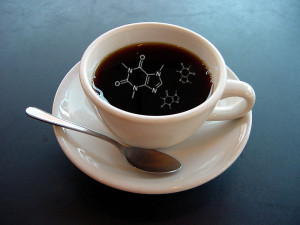Player FM 앱으로 오프라인으로 전환하세요!
PULSE! #4 – Better Coffee Through Chemistry
Manage episode 56677721 series 30865

Image from Wikipedia with slight modifications
Most coffee-particular people already know that the quality of the water you use is important for good coffee, but a recent paper describes how affecting the specific hard mineral content can have important changes in the relative extraction of specific flavor and strength affecting chemicals in your brew. We discuss the basics of coffee preparation, and the conclusions of the paper.
1:15 Greg throws out a Leeroy Jenkins reference right off the bat. (I guess wait for episode 32.33?)
2:00 the article that prompted this show was “A Chemist Has Uncovered A Secret To Brewing Delicious Coffee At Home” published in Business Insider on Jun 5th, 2014.
2:45 The paper is called “The Role of Dissolved Cations in Coffee Extraction”, by Christopher H. Hendon, Lesley Colonna-Dashwood, and Maxwell Colonna-Dashwood, published in the Journal of Agricultural and Food Chemistry.
3:50 The researcher identified seven chemicals important to the flavor and strength of coffee, and used density functional theory to calculate the bonding energy between these chemicals and common ions in water that contribute to water hardness.
6:45 one of the chemicals present in Coffee, eugenol, is also present in whisky and other barrel-aged liquors.
16:00 It might be useful to suggest to coffee brewers to use distilled or reverse osmosis water and then add something similar to these brewing salts to the water to facilitate extraction!
18:10 The paper only talks about water with Total Dissolved Solids (TDS) of <300 ppm, which is standard for municipal water supplies, but well or ground water in areas (like our own Phoenix area) can have much more calcium hardness than that.
Links to the music used in this week’s episode:
Intro: Intro – Crying (Return to Olde World)
Outro: Dreams are Maps – The Wild (Dreams are Maps)
26 에피소드
Manage episode 56677721 series 30865

Image from Wikipedia with slight modifications
Most coffee-particular people already know that the quality of the water you use is important for good coffee, but a recent paper describes how affecting the specific hard mineral content can have important changes in the relative extraction of specific flavor and strength affecting chemicals in your brew. We discuss the basics of coffee preparation, and the conclusions of the paper.
1:15 Greg throws out a Leeroy Jenkins reference right off the bat. (I guess wait for episode 32.33?)
2:00 the article that prompted this show was “A Chemist Has Uncovered A Secret To Brewing Delicious Coffee At Home” published in Business Insider on Jun 5th, 2014.
2:45 The paper is called “The Role of Dissolved Cations in Coffee Extraction”, by Christopher H. Hendon, Lesley Colonna-Dashwood, and Maxwell Colonna-Dashwood, published in the Journal of Agricultural and Food Chemistry.
3:50 The researcher identified seven chemicals important to the flavor and strength of coffee, and used density functional theory to calculate the bonding energy between these chemicals and common ions in water that contribute to water hardness.
6:45 one of the chemicals present in Coffee, eugenol, is also present in whisky and other barrel-aged liquors.
16:00 It might be useful to suggest to coffee brewers to use distilled or reverse osmosis water and then add something similar to these brewing salts to the water to facilitate extraction!
18:10 The paper only talks about water with Total Dissolved Solids (TDS) of <300 ppm, which is standard for municipal water supplies, but well or ground water in areas (like our own Phoenix area) can have much more calcium hardness than that.
Links to the music used in this week’s episode:
Intro: Intro – Crying (Return to Olde World)
Outro: Dreams are Maps – The Wild (Dreams are Maps)
26 에피소드
모든 에피소드
×플레이어 FM에 오신것을 환영합니다!
플레이어 FM은 웹에서 고품질 팟캐스트를 검색하여 지금 바로 즐길 수 있도록 합니다. 최고의 팟캐스트 앱이며 Android, iPhone 및 웹에서도 작동합니다. 장치 간 구독 동기화를 위해 가입하세요.




